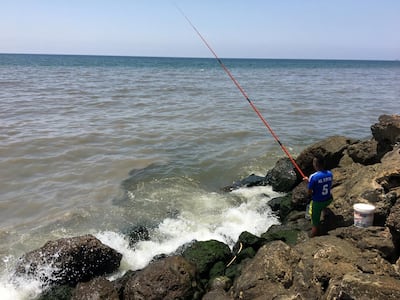The beaches of Jounieh, a popular Lebanese coastal city 16 kilometres north of Beirut, are typically reserved for laying in the sun, family days out, and watersports in the bay.
But the bacteria levels in the waters around this former fishing village are more than 100 times the amount that would prompt the closure of a public beach in the state of New York in the United States.
Farther south at Ouzai, a seaside neighbourhood of the Lebanese capital, a grey coat of raw sewage in the Mediterranean sea is clearly visible on Google Maps.
“The smell can kill you,” says a 10-year-old boy from the neighbourhood.
“We swim over there, instead of here,” he continues, pointing to an inlet adjacent to the one where the sewage enters the sea.
The toxic waters of Ouzai and Jounieh are both grim examples of Lebanon's waste disposal problem, which has left the coastline with ever-worsening pollution.
In the 1960s and 1970s, Lebanon’s beaches were a destination for holidaymakers. But the issue of water safety in Lebanon has descended into such a crisis that authorities now advise against swimming in the sea anywhere along the country’s coastline.
"The government must declare a state of emergency for water quality in Lebanon," Michel Afram, head of the Lebanese Agricultural Research Institute, told The National.
The environmental body says high concentrations of heavy metals have been found off the coast and it is now conducting an assessment of fish caught in the country’s waters.
The sewage flow at Ouzai is unique only in that it is readily visible – submarine pipes do most of the direct dumping.
“Ninety per cent of Lebanon’s wastewater goes untreated to the sea,” says Ziad Abichaker, an environmental engineer specialising in waste management.
An inlet at Ouzai is murky brown and opaque. Just metres away, men fish for their catch. The sand on the beach, strewn with garbage, has turned black in places.
“It’s been like this for years,” says one resident.

Lebanese Environment Minister Tarek Khatib has previously denied the country is experiencing a waste crisis. He could not be reached for comment.
While some newly-elected members of parliament have drawn attention to the waste disposal issue in the past week, Mr Abichaker said he was not optimistic.
“It seems this political class is unable to manage the country,” he says. “This is not rocket science, wastewater, treatment – it’s pretty basic. It just needs some integrity and some political willingness.”
The mismanagement of Lebanon’s solid waste is an ongoing affliction that has only made the problem worse. Seaside landfills leach directly into the water around Beirut, and a recent ban on burning rubbish has placed greater pressure on the government to find ways to dispose of the trash.
Dumping has turned most of Lebanon’s rivers into ecological disasters, far more polluted than the sea into which they flow.
_____________
Read more
Lebanon rubbishes its tourism industry
Lebanon residents wake up to beach covered in rubbish
_____________
Mr Afram and others have warned about these problems for years. But one month into summer, they appear to have had little effect on beachgoers. Just four kilometres to the north of Ouzai, Beirut’s only public beach, Ramlet Al Baida, remains full of swimmers.
“We know the water is not clean, but the state doesn’t do anything,” says Hussein Bazzi, who lives in Beirut and had brought his five-year-old son to the beach.
Mr Bazzi says his salary is not enough to be able to afford the entrance fees for a private beach, which could be located where the water is cleaner.
“People can’t afford to go anywhere else. We only have this place,” he says. “We only stayed in the water for half an hour.”
Government officials have been forced to acknowledge that pollution has taken a significant toll on public health in Lebanon, with reported cancers rising sharply in recent years.
In a country faced with an array of threats, the most pernicious danger for the average Lebanese citizen now lies in the water they drink and the air that they breathe.
“There is always something more important,” Mr Afram says. “But I feel my life is more threatened by pollution than security or what is happening in Syria.”

